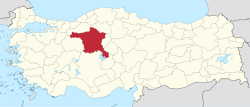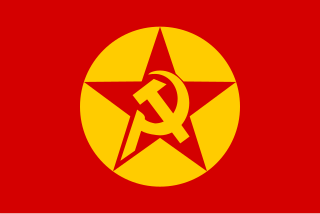
The Revolutionary People's Liberation Party/Front is a Marxist–Leninist communist party in Turkey. It was founded in 1978 as Revolutionary Left, and has been involved in a militant campaign against the Republic of Turkey since the 1980s. It was renamed in 1994 after factional infighting. It is classified as a terrorist group by Japan, Turkey, the United States, the United Kingdom and the European Union.
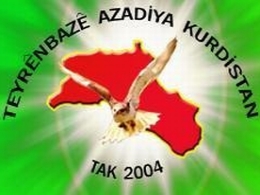
The Kurdistan Freedom Hawks or TAK, is a Kurdish nationalist militant group in Turkey seeking an independent Kurdish state in Turkish Kurdistan. The group also opposes the Turkish government's policies towards Kurds in Turkey.

The 2007 Ankara bombing was a suicide attack that occurred in Ankara, the capital of Turkey, on 22 May 2007. Six people were reported killed, including one of Pakistani origin, and 121 people were wounded. A seventh person died from his injuries on 7 June and another on 17 June raising the death toll to eight. A ninth person died on 4 July from his injuries.

Dursun Karataş was a Turkish communist of Kurdish descent. He commanded the revolutionary left and DHKP-C. DHKP-C is seen as a "terrorist organization" in Turkey, the EU and the USA. The revolutionary left was closed in the 90s due to lack of personnel.

On 6 January 2015, Diana Ramazova from Dagestan detonated a bomb vest at a police station in Istanbul's central Sultanahmet district, near the Blue Mosque and Hagia Sophia. The attack killed Ramazova and injured two police officers, one of whom later succumbed to his wounds. Ramazova was the pregnant widow of a Norwegian-Chechen ISIS fighter in Syria who had been killed in December 2014.
The following lists events in the year 2013 in Turkey.
The DHKP/C insurgency in Turkey refers to the Marxist–Leninist insurgency waged by the Revolutionary People's Liberation Party/Front (DHKP/C) against the Republic of Turkey, ongoing since 1990. The insurgency began with political assassinations in the early 1990s, and has escalated in the past few years with the use of suicide bombers.

The Suruç bombing was a suicide attack by the Turkish sect of Islamic State named Dokumacılar against Turkish leftists that took place in the Suruç district of Şanlıurfa Province in Turkey on 20 July 2015, outside the Amara Culture Centre. A total of 34 people were killed and 104 were reported injured. Most victims were members of the Socialist Party of the Oppressed (ESP) Youth Wing and the Socialist Youth Associations Federation (SGDF), university students who were giving a press statement on their planned trip to reconstruct the Syrian border town of Kobanî.

The Turkey–Islamic State conflict were a series of attacks and clashes between the state of Turkey and the Islamic State. Turkey joined the War against the Islamic State in 2016, after the Islamic State attacks in Turkey. The Turkish Armed Forces' Operation Euphrates Shield was aimed against both the Islamic State and the SDF. Part of Turkish-occupied northern Syria, around Jarabulus and al-Bab, was taken after Turkey drove the Islamic State out of it.

On 10 October 2015 at 10:04 local time (EEST) in Ankara, the capital city of Turkey, two bombs were detonated outside Ankara Central railway station. With a death toll of 109 civilians, the attack surpassed the 2013 Reyhanlı bombings as the deadliest terror attack in Turkish history. Another 500 people were injured. Censorship monitoring group Turkey Blocks identified nationwide slowing of social media services in the aftermath of the blasts, described by rights group Human Rights Watch as an "extrajudicial" measure to restrict independent media coverage of the incident.

On 12 January 2016, a suicide attack in Istanbul's historic Sultanahmet district killed 13 people, all foreigners, and injured 14 others. The attack occurred at 10:20 local time, near the Blue Mosque and the Hagia Sophia, an area popular among tourists. The attacker was Nabil Fadli, a Syrian member of the Islamic State.
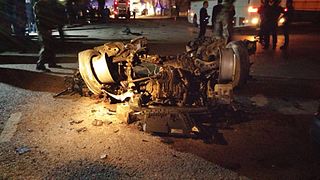
The February 2016 Ankara bombing killed at least 30 people and injured 60 in the capital of Turkey. According to Turkish authorities, the attack targeted a convoy of vehicles carrying both civilian and military personnel working at the military headquarters during the evening rush hour as the vehicles were stopped at traffic lights at an intersection with İsmet İnönü Boulevard close to Kızılay neighborhood. Several ministries, the headquarters of the army and the Turkish Parliament are located in the neighbourhood where the attack occurred. The Kurdistan Freedom Hawks (TAK) took responsibility for the attack and said they targeted security forces. Censorship monitoring organization Turkey Blocks reported nationwide internet restrictions beginning approximately one hour after the blast pursuant to an administrative order. The attack killed 14 military personnel, 14 civilian employees of the military, and a civilian.

On 19 March 2016, a suicide bombing took place in Istanbul's Beyoğlu district in front of the district governor's office. The attack occurred at 10:55 (EET) at the intersection of Balo Street with İstiklal Avenue, a central shopping street. The attack caused at least five deaths, including that of the perpetrator. Thirty-six people were injured, including seven whose injuries were severe. Among those injured were twelve foreign tourists. Among those killed, three were of Israeli nationality. On 22 March, the Turkish interior minister said that the bomber had links with ISIL.

On 27 April 2016, a suicide bombing took place in the Turkish city of Bursa. The bombing took place at 17:26 (UTC+3), near the western entrance of the Grand Mosque and a covered market. One person, the suicide bomber, was killed and 13 people were injured. The injured people received only light injuries. Extensive damage to nearby shops and cafes was reported.
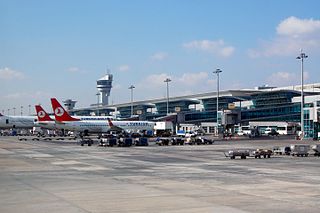
The Atatürk Airport attack, consisting of shootings and suicide bombings, occurred on 28 June 2016 at Atatürk Airport in Istanbul, Turkey. Gunmen armed with automatic weapons and explosive belts staged a simultaneous attack at the international terminal of Terminal 2. Three attackers and forty-five other people were killed, with more than 230 people injured. Monitoring group Turkey Blocks identified widespread internet restrictions on incoming and outgoing media affecting the entire country in the aftermath of the attack.
Definition of terrorism in Turkey is categorized under Turkey's criminal law as crimes against the constitutional order and internal and external security of the state by the use of violence as incitement or systematic to create a general climate of fear and intimidation of the population and thereby effect political, religious, or ideological goals. Since the establishment of the Republic of Turkey, both organized groups, lone wolf, and international spy agencies have committed many acts of domestic terrorism against Turkish people.
On 18 January 2020, a suicide car bombing killed four and injured at least 20 others in Afgooye, approximately 30 kilometres (19 mi) from the Somali capital, Mogadishu. Most of the casualties were police officers protecting Turkish contractors building a road. The al-Qaeda-linked extremist group al-Shabaab claimed responsibility for the attack.

The 2012 Istanbul suicide bombing occurred at a police station in the Sultangazi district of Istanbul, Turkey. The suicide bomber was İbrahim Çuhadar, a member of the Revolutionary People's Liberation Party/Front (DHKP-C). On 11 September 2012, he went to the police station and attempted to enter, then detonated the explosives at the entrance of the station after the police refused him entrance. As a result of the explosion, the attacker and a police officer died and seven others were injured.
